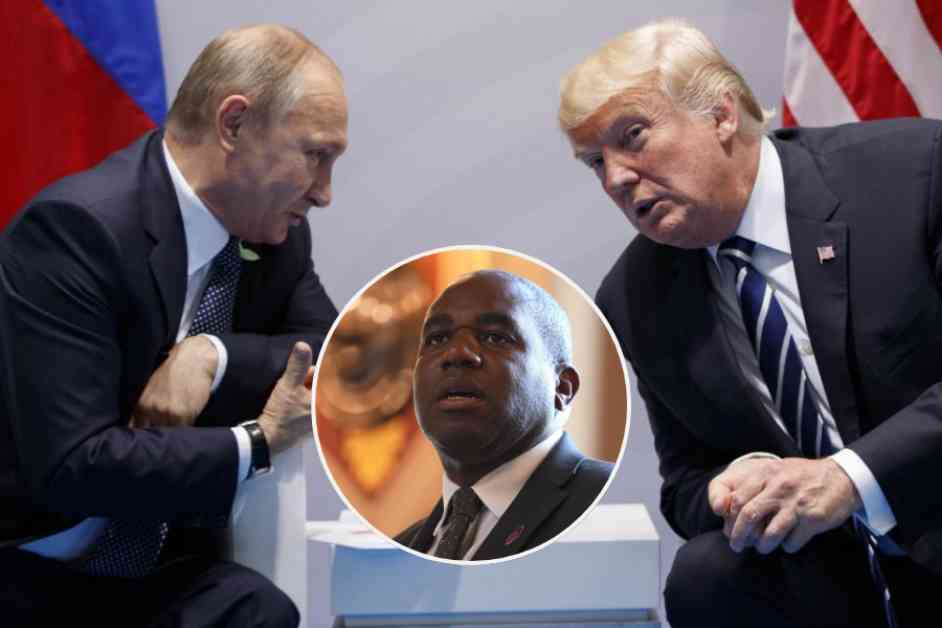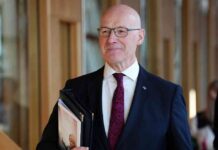Foreign Secretary Engages G7 Allies in Munich Amid Ukraine Crisis
Today, Foreign Secretary David Lammy is scheduled to convene with G7 allies at the Munich Security Conference. The high-stakes meeting comes in the aftermath of President Donald Trump’s recent discussions with Russian President Vladimir Putin, sending shockwaves through the Western diplomatic landscape.
As Lammy embarks on this crucial diplomatic mission, the focus of the conference is expected to center around Ukraine, in light of President Trump’s unexpected shift in policy regarding the conflict that began with Russia’s invasion three years ago. Despite initial ambiguity on involving Ukraine in peace talks, President Trump’s recent statements underscore a newfound commitment to including the nation in negotiations moving forward.
The United States’ sudden pivot towards collaboration with Russia on resolving the conflict in Ukraine has raised eyebrows among global leaders, with concerns over the implications of this strategic realignment. The prospect of Russia’s readmission to the G7, following its expulsion in 2014 over the Crimea invasion, has reignited debates on the future of European security and the role of international alliances in preserving peace and stability.
Ukraine’s Role in Peace Negotiations
Amidst escalating tensions and shifting geopolitical dynamics, Ukrainian President Volodymyr Zelensky has been adamant about his country’s indispensable role in any peace negotiations concerning its future. He emphasized that Ukraine cannot afford to be sidelined in discussions that directly impact its sovereignty and territorial integrity.
While the United States has hinted at potential territorial concessions for Ukraine in a peace deal, questions loom large over the extent of Russia’s obligations in such an agreement. The delicate balance of power in the region, coupled with the strategic interests of key players, underscores the complex nature of resolving the conflict and ensuring a lasting peace for Ukraine.
Unwavering Support for Ukraine’s NATO Aspirations
Within the context of ongoing deliberations on Ukraine’s future, the issue of its NATO membership remains a contentious topic. Despite diverging views on the feasibility of Ukraine joining the alliance, NATO’s official stance, backed by the UK’s enduring partnership with Ukraine, asserts that Kyiv is on an “irreversible” path towards NATO accession.
Former MI6 chief Alex Younger’s remarks on the substantial concessions demanded of Ukraine without commensurate reciprocity from Russia highlight the asymmetric nature of the negotiations. As diplomatic maneuvers unfold in Munich, the intricate dance of diplomacy and power dynamics will shape the contours of any potential peace deal in the region.
As Lammy engages with a diverse array of stakeholders at the conference, including representatives from Europe, the Middle East, and North America, the stakes are higher than ever for charting a course towards peace and stability in Ukraine. Alongside Defense Secretary John Healey’s active involvement in Nato meetings and Ukraine Defense Contact Group discussions, the UK remains firmly committed to upholding the principles of international cooperation and collective security in the face of evolving global challenges.
In the crucible of international diplomacy, where words and actions carry profound consequences, the Munich meeting serves as a pivotal moment in shaping the future trajectory of Ukraine and its relations with key global players. As the world watches with bated breath, the intricate tapestry of alliances, interests, and aspirations converges in a delicate dance of diplomacy and statesmanship, with the fate of a nation hanging in the balance.












